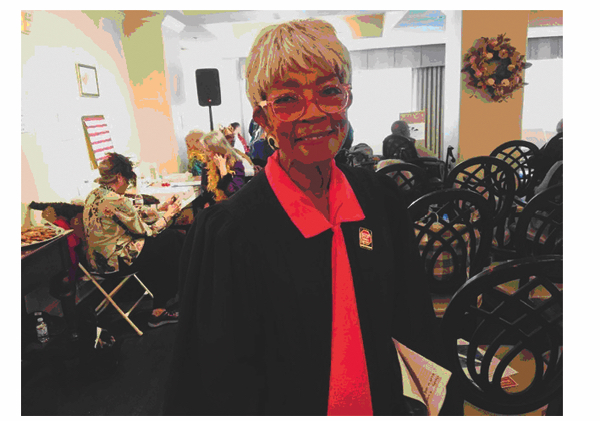30 Dec NEW TRENDS IN SENIOR SCAMS 2023

Dr. Sherry McCoy PhD
is a freelance writer & actor for the Stop Senior Scams Acting Program (SSSAP) in Los Angeles. Follow SSSAP on Facebook . For more info re: SSSAP, contact Adrienne Omansky at SSSAP4U@gmail.com. Questions for the writer should be directed to “Dear Sherry” at Not Born Yesterday! P.O. Box 722, Brea, CA 92822 or nbynews@juno.com.
NEW TRENDS IN SENIOR SCAMS 2023
Dr. Sherry McCoy, PhD – Stop Senior Scams ℠ Acting Program
Happy New Year! It’s January 2023 and the new year has arrived. So, let’s hit the road running, and get a leg up on the scammers out there who are already plotting devious ways to steal our hard-earned cash, property, and wellbeing. Let’s begin by reviewing some of the top scams that target seniors. Then, we will take a look at a couple of important new developments that I think signify an increase in our collective awareness about the impact of senior scams. These developments show that we – collectively — are making progress; we are evolving in our consciousness – and that’s a good thing. Something to celebrate in the New Year!
TOP 10 SENIOR SCAMS
The U.S. Senate Special Committee on Aging (USSSCA) indicates the following top 10 senior scams in its current Fraud Book, “Fighting Fraud: Top Scams in 2021.” The data in this Fraud Report comes from scams reported to USSSCA via their toll-free Fraud Hotline, 1-855-303-9470. You can read the entire report by Senator Robert P. Casey, Jr. (D-PA), Chairman, and Senator Tim Scott (R-SC), Ranking Member, at https://www.aging.senate.gov/download/aging-committee-fraud-book-2022.
- Government Imposter Scams – When fraudsters pose as representatives of IRS, Social Security, Medicare, etc., and threaten loss of benefits or demand immediate payment of taxes or fees. In 2021, the top government imposter scam reported to the Fraud Hotline was scammers posing as agents of the Social Security Administration.
- Identity Theft – When scammers wrongfully obtain your personal info (like Social Security Number, bank account info, etc.) and use that information to steal from you. In 2020, the Federal Trade Commission (FTC) received approximately 1.4M reports of identify theft.
- Business Impersonation & Shopping Scams – This type of scam is similar to government imposter scams. The difference is that instead of posing as a government employee, the scammer poses as an employee of a business. The intent is the same, however, and that is to take something that does not belong to them. According to the FTC, business impersonation scams disproportionately affect seniors.
- Robocalls & Unsolicited Calls – Unsolicited robocalls rank as the top consumer complaint with the FTC, and 4th with USSSCA’s Fraud Hotline. These calls usually try to sell a product or service and try to trick the recipient into divulging personal info.
- Healthcare & Health Insurance Scams – This is another version of the imposter scam. In this case, the scammer pretends to be a representative of Medicare or some other health insurance provider in order to sell you “discount health plans,” i.e., fake health insurance. The Federal Communications Commission (FCC) says that these types of scam calls tend to spike during the Medicare open enrollment period each year (Oct. – Dec.).
- Sweepstake & Lottery Scams – This is where a scammer leads you to believe that you’ve won a grand prize in a lottery or sweepstakes, and all you have to do to collect your winnings, is pay a small tax or fee. The payment must be made, however, in cash, or via gift cards, electronic wire transfer, or money order! But the problem is — the whole thing is bogus. In 2020, the FTC found that seniors lost $69M to scams of this nature.
- Tech Support & Computer Scams – Another version of the imposter scam, only in this situation, the con artist poses as a tech representative of a well-known tech company, like Microsoft, Dell, or Apple. A common tactic used in these types of scams is for the scammer to claim your computer has been infected with a virus and ask for you to allow them to remotely access your computer in order to clean up the virus. They may also ask for your credit card or banking information to bill for the repairs. You wind up paying a lot of money for a problem that never existed in the first place! The FTC reports that seniors are particularly vulnerable to this type of scam, more so than younger people.
- Romance Scams – During the pandemic and with the rise in social media platforms, romance scams have become a lucrative business for scammers. Using romance as the hook, they target people looking for companionship, and pretend to quickly “fall in love.” The scammer often pretends to live overseas, and suddenly develops a problem, like a sick relative who needs urgent medical attention, and asks for money to help. $1.3B were lost to romance scams over the past 5 years, according to the FTC.
- Financial Services Impersonation & Fraud – Debt and mortgage fraud were the most common financial services scams reported to the Committee’s Fraud Hotline in 2021. In debt fraud, scammers impersonate debt collectors and try to trick you into paying for a debt that doesn’t exist. In mortgage relief fraud, fraudsters may make promises to change a mortgage loan, lie about the term of a loan, or guarantee services they can’t deliver. In 2021 nationally, the FTC reported 151,000 cases of debt fraud, and 21,000 cases of mortgage fraud.
- Person-in-Need & Grandparent Scams – The grandparents’ scam is an imposter scam, where a scammer pretends to be your grandchild, or a friend of your grandchild, or a law enforcement officer who allegedly has your grandchild in custody due to an automobile accident, being in jail for some crime, etc. The scammer asks for you to wire them money to deal with the emergency. None of it is real. “In July 2021, a federal indictment charged eight people who allegedly ran a national grandparents scam and stole an estimated $2M from more than 70 older adults between 2019 and 2020.”
NEW DEVELOPMENTS IN AWARENESS
It is important to note that whenever a new idea emerges into our consciousness, it requires some sort of action in order for the new idea to take shape and form in external reality. In other words, we have to “do” something in order to make the new thought a reality in the physical world. If we don’t, the idea remains “unborn.” For example, someone somewhere long ago had the “idea” of a chair. Thank goodness they decided to take action and give it physical life; otherwise, we would have no where to sit!
All joking aside, our thoughts are creative, i.e., thoughts tend to create form. Therefore, in the context of the growing awareness of the impact of senior scams, it is significant to note that AARP Fraud Watch Network recently announced the development of a free program that offers emotional support for victims of fraud! Here’s what AARP has to say about the new program.
Know that you are not alone
The AARP Fraud Watch NetworkTM and Volunteers of America (VOA) have created a new program to help you. It’s VOA | ReST, which stands for Resilience, Strength and Time. The program is designed to address the emotional impact of your experience. We offer free, facilitated peer discussion groups that seek to provide emotional support for you and others in similar situations. Family members are invited to participate at your discretion. The AARP Fraud Watch Network VOA | ReST program features small groups whose members are led in discussion by one or more trained peer facilitators. The aim is to help you re-establish trust, integrate your experience and build back your resilience despite a difficult and painful occurrence. Online, hour-long sessions are scheduled nearly every day. You can join by computer, tablet or smartphone. Discussions are confidential. You are welcome to attend one session or several – it’s your choice. Experiencing a scam can be devastating, but it doesn’t have to define you. Sign up for a session and take an important step toward emotional recovery.
To learn more about this program and/or to participate, click this link — https://www.aarp.org/money/scams-fraud/voa-rest-program/?cmp=RDRCT-62f39e08-20210528
In a similar vein, the U.S. Senate Special Committee on Aging has also added something to their website to help seniors report scams and receive personalized support. Click on this link — https://www.aging.senate.gov/fraud-hotline — to see the new web form you can use to report fraud to the USSSCA’s Fraud Hotline.
Both the AARP new program and the USSSCA new web form are examples of how we are all in this together. How what affects one, affects all. And how, when we work together and share our stories with others, good things can happen. New ideas can be born, and everybody benefits! I look forward to hearing from you in 2023. Together, we can stop senior scams!
Be Empowered. Find Your Voice. Speak Out About Fraud!
WHERE TO REPORT SCAMS
Federal Trade Commission at 877-382-4357 or online at https://www.ftccomplaintassistant.gov/#crnt&panel1-1.
For questions about Medicare fraud / abuse, contact Senior Medicare Patrol (SMP*) at 1-855-613-7080.
U.S. Senate Special Committee on Aging’s Fraud Hotline at 1-855-303-9470.
RECOGNITION FOR SSSAP AND FRIENDS

SSSAP celebrated the holidays in December 2022 at the Original Farmers Market in Los Angeles. We are proud to continue our tradition of donating toys to the annual Spark of Love Toy Drive for the LAFD and LA County Fire Department! Happy New Year!
SSSAP thanks the U.S. Senate Special Committee on Aging for continuing their designation for a day in May as National Senior Fraud Awareness Day!

In loving memory of our dear friend, Francine Lyles, who passed away in mid-December. She educated hundreds of older adults since our Stop Senior Scams Acting Program officially started in 2009. Judge Francine Lyles was a woman of Valor and was committed to Stopping Senior Scams. Condolences to her family and friends. She will live on in our hearts forever, and she will be missed by everyone.
Remember: You may be a target, but you don’t have to be a victim!
Dr. Sherry McCoy, PhD is a freelance writer & actor for the Stop Senior Scams ℠ Acting Program (SSSAP) in Los Angeles. Follow SSSAP on Facebook at https://www.facebook.com/SSSAP2016/?fref=ts. For more info re: SSSAP, contact Adrienne Omansky at SSSAP4U@gmail.com. Questions for the writer should be directed to “Dear Sherry” at Not Born Yesterday! P.O. Box 722, Brea, CA 92822 or nbynews@juno.com.




Sorry, the comment form is closed at this time.